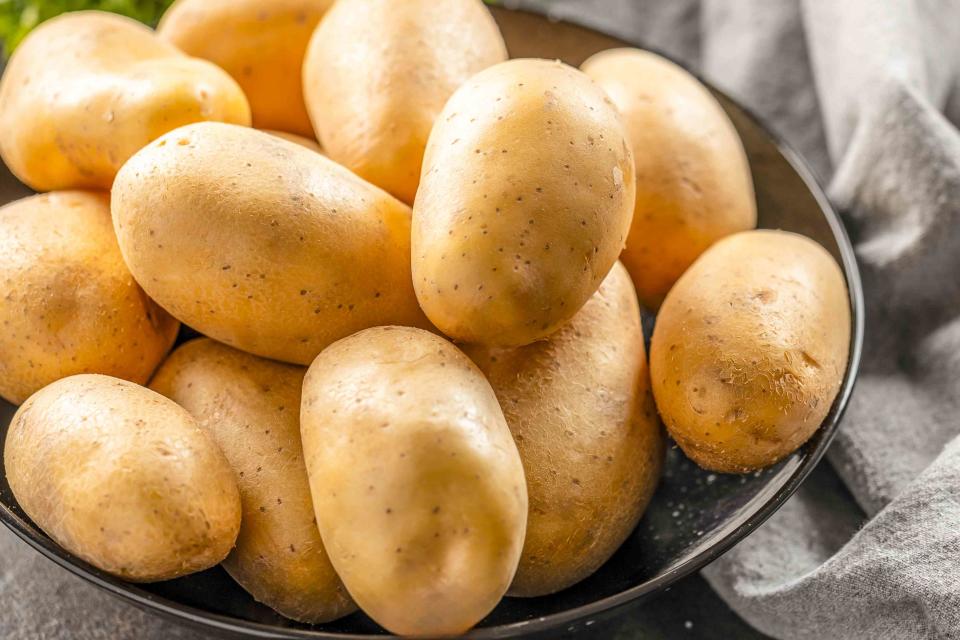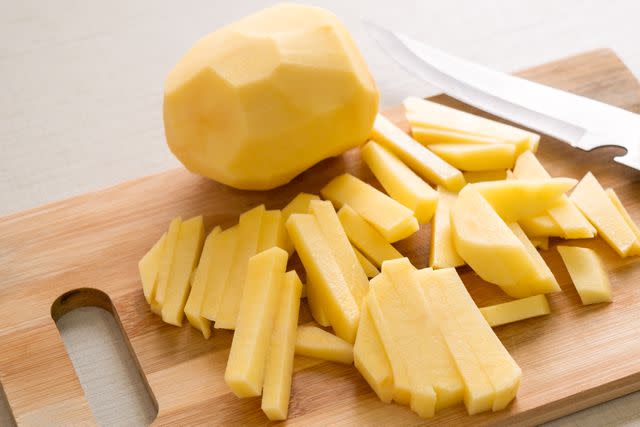Yukon Gold vs. Russet Potatoes: An Expert Explains the Difference
There’s one difference between the two that really matters.

Simply Recipes / Getty Images
Po-tay-to, Po-tat-oh, right? Wrong! With over 5,000 species of potatoes grown worldwide, their diversity is dizzying. While you won’t find quite that wide of a variety in your local produce section, there are still dozens of options to choose from.
Two of my very favorites are Russets, or Idaho potatoes, and Yukon Golds. Every year on Thanksgiving, my mother laments my request for Yukon Golds in her mashed potatoes. She doesn’t understand why she can’t just use the Russets she invariably already has in her pantry. After ten years of responding “just because,” I decided to bring in an expert.
I spoke with RJ Harvey, a registered dietitian and the Director of Culinary at Potatoes USA. Harvey has worked in the kitchens of The French Laundry, Alinea, and Daniel. Safe to say, he knows a thing or two about creating world-class potato dishes.
What Is the Difference Between Yukon Gold Potatoes and Russets Potatoes?
My antiquated notion about the fundamental difference between these two species of potatoes was that Yukon Gold potatoes are waxy, while Russets are starchy. Harvey observes that this is somewhat of an outdated concept.
“Potatoes have sort of expanded beyond the classification of waxy versus starchy,” he says. “The first thing I always like to point out is that Yukon Gold is just a brand name for yellow potatoes.” The difference between Russet potatoes and yellow, red, or other colored potatoes comes down to their moisture content.
Russets contain significantly less moisture, which allows them to get fluffy when baked and super crispy when fried. Yellow potatoes, which contain more moisture, don’t break down as fast as Russets, making them suitable for long-cooked dishes like soups, stews, and braises.
What Are the Nutritional Differences Between Yukon Golds and Russets?
As for nutrition, Yukon Golds and Russets are nearly identical. I was interested to learn from Harvey that in both varieties, a medium-sized potato contains more potassium than a banana!
“Potatoes are an incredibly nutritionally dense food,” says Harvey. According to Potatoes USA’s website, “a medium-sized (5.3 ounce) potato with skin on provides 26 grams of carbohydrates, 620 mg of potassium, 27 mg of vitamin C, 2 grams of fiber and 3 grams of protein.” Plus, they are free of fat, sodium, and cholesterol. Talk about a superfood!

Simply Recipes / Getty Images
Do Yukon Gold and Russet Potatoes Taste Different?
Yukon Golds are prized for their nuanced, buttery taste—in part, says Harvey, because their high water content makes them taste creamier. “Yellow potatoes do have slightly more sweetness which helps with the perceived buttery flavor,” he notes. “Also, since we often assimilate color with flavor, sometimes that buttery richness is influenced by the look of the potatoes.”
With their thin skins, yellow potatoes don’t have the same earthiness as Russets. Yet, while the taste of Russets’ skin is more pronounced, the flesh is more of a blank canvas. The mild flavor makes Russets very versatile. The flesh is also pure white, which plays into how we taste them. They are often described as almost floury in texture.
Can You Use Yukon Gold and Russet Potatoes Interchangeably in Recipes?
In most recipes, Harvey’s expert opinion is that the two potatoes can be swapped for one another with relative ease.
That said, there are certain dishes that are better designed for one or the other variety. “I’d never make a soup with Russets, and I wouldn’t want to make fries with yellow potatoes,” he says.
When you are trying to decide which potato to use, he advises, consider the moisture level over the flavor. Going for cloudlike gnocchi? Choose a Russet potato. For super velvety mashed potatoes, reach for the yellow spuds.
That said, Harvey does concede that if you like the dish fluffy and light, “Russets are great for mashed potatoes, too.” Just don’t tell my mom!
Read the original article on Simply Recipes.


